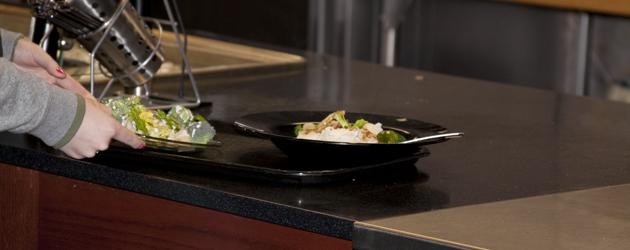
Pro-trays
It is now in the students’ hands whether they are “green” conscious. The Greenfield sustainability club no longer removes the trays in Dillin Hall on Tuesday evenings.
“I think that we could save water in other ways than by not using the trays,” sophomore David Lee said. “How about the people who think it will help do not use them and see how much that helps? I’ll just try to take shorter showers and not keep the water running while brushing my teeth.”
Some students are having a hard time seeing the “bigger picture.” Since the theory of saving water and energy with the effort of Trayless Tuesday was
proved false, many students on campus feel Trayless Tuesdays should no longer exist.
“It is a pain to have to walk back and forth because your plates just stack up at your table, which also makes it a hassle to put our plates away,” freshman Nizar Tarhuni said. “Honestly, everyone always talks about how we pay $40,000 a year to go here. We should be able to get our food without it being difficult, and they should find some other way to conserve water that isn’t such a pain.”
Sophomore Niki Raissian also said Trayless Tuesday is an inconvenience.
“I heard they keep the dishwasher on at all time anyway,” she said. “If they keep the dishwasher on at all times, why not have trays available? If they have to wash a bunch of dishes anyway, it doesn’t take that much more water to wash a tray.”
Corrina Crocker
Features reporter Corrina Crocker can be reached at [email protected]
No-trays
Despite the irritated students who twitch at the thought of not having a tray every Tuesday night at Dillin, there are students who believe Tuesday is sacred when it comes to creating a positive impact.
After last week’s story describing the cons of Trayless Tuesday (“Trayless Tuesdays fail to save water, power in Dillin,” TLR, March 5) rumors have surfaced across campus that water is not saved when trays are removed. The truth is, not using trays does save water.
When trays are removed from Dillin, Bill Massulo, general manager of Student Dining Services, said the dishwasher is turned off earlier because a lack of dishes to wash. The washer can be turned off from a few minutes to a whole hour earlier than usual, Masullo said. Every minute counts when it comes to saving water.
Although the trays are no longer taken away from students, Greenfield has been providing information on why it wanted to discard them originally. Dillin attendees have been educated with fliers, petition signings and colorfully made signs distributed across the facility as advertisements to state why the trays are not attending dinner Tuesday evenings.
This once-a-week strategy has been used in past years but has not been successful because of angry, uneducated students. This year, many Greenfield members have encouraged students to help as well as learn about water usage and being energy efficient.
Freshman Tyler Gerlach said he was intrigued that Greenfield would use Dillin as a resource to help the environment, so he immediately joined after he arrived at Linfield.
“I knew they needed people that would be committed,” he said. “It’s more about the mind-set with Trayless Tuesday. It’s about being educated.”
At the beginning of the school year, a group of students were so annoyed with Trayless Tuesdays that they left behind dishes as evidence of their frustration. Their actions created more work for Dillin staff to clean up while the group of students displayed nothing but juvenile behavior.
According to the Bonneville Environmental Foundation for Renewable Energy, about 97.5 percent of the earth’s water is salt water, leaving the 2.5 percent of the rest for everyone to share. On average, each American uses more than 100 gallons of water every day, which is double the amount of what Europeans use and 40 times as much as the average person in the developing world.
The General Accounting Office discovered that water managers in 36 states across the United States anticipate water shortages locally, regionally or statewide within the next 10 years. Although we are using this much water, and may suffer from scarcity, the environment still needs water, too.
Freshman Amy Krol says it is not just Linfield that has removed trays.
“Schools all over the country are going trayless,” she said. “By providing information, we are giving an option to use a tray or not. Think about the choice and the impact it will make.”
Lauren Ostrom
Features editor Lauren Ostrom can be reached at [email protected]


Mark Johnson • Mar 12, 2010 at 8:36 pm
Amy Krol: The problem with your statement is that it hasn’t EVER been an option until now. People in the past have gone along with it because they were TAKEN AWAY. No choice, no common sense, no giving options. Just taking things away. That is the whole initiative behind the green movement. Control, and taking away.